In the ongoing debate surrounding the prospects and implications of the possible normalizing of relations between Saudi Arabia, a nation of significant economic, regional, and religious importance, and the state of Israel, Arab intellectuals, including Saudis, have offered differing perspectives as they navigate the potential costs and benefits of such a move. While the opposition, primarily comprising Saudi dissidents residing outside the country and anti-government Islamist figures, argue that such a step could pave the way for the overthrow of the Al-Saud ruling dynasty, supporters believe that with careful consideration, Saudi Arabia could realize multiple gains and contribute to the stabilization of a highly volatile region by resolving the Israeli-Palestinian conflict and strengthening its military capability and economy.
This discussion has gained momentum in recent times, particularly following an official Israeli delegation's visit to Riyadh to attend UNESCO meetings. Critics of the Saudi regime view this as a significant step toward normalizing relations with Israel. In this report, we will explore the arguments put forth by both sides in favor of or against the normalization of relations between Saudi Arabia and Israel, as well as the potential costs and benefits discussed as associated with such a move.
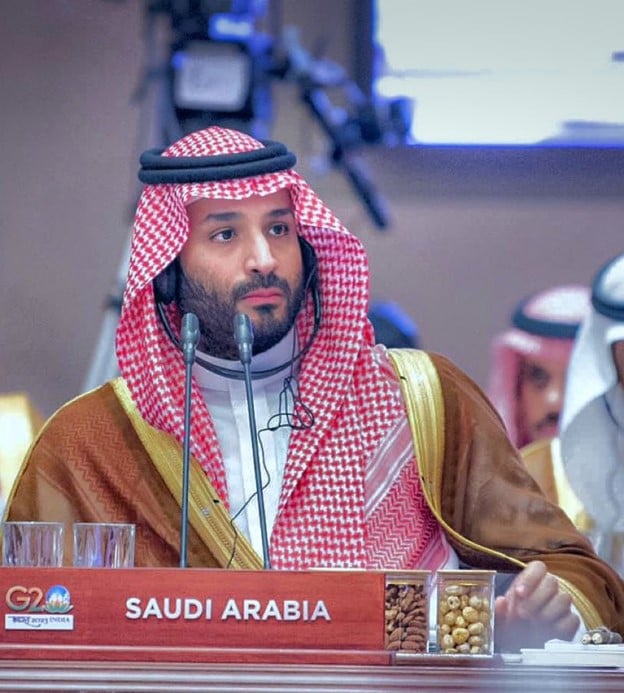
Those who oppose normalizing relations with Israel often base their rejection on the historic enmity between Muslims and Jews, viewing such a move as a form of religious treason and a challenge to the divine guidance regarding the supposed eternal enmity between Jews and Muslims, as stated in the Quran and the sayings of the Prophet Muhammad.
For example, Saudi Dr. Hanan Al-Utaybi, who has over 34 thousand followers on the X platform (formerly Twitter) downplayed any potential economic, political, and other benefits that Saudi Arabia might gain from normalizing relations with Israel. In a post published on September 13, 2023, she urged her audience to remember the divine warning: "Never will the Jews or the Christians be satisfied with thee unless thou follow their form of religion (Quran 2:120)."[1]
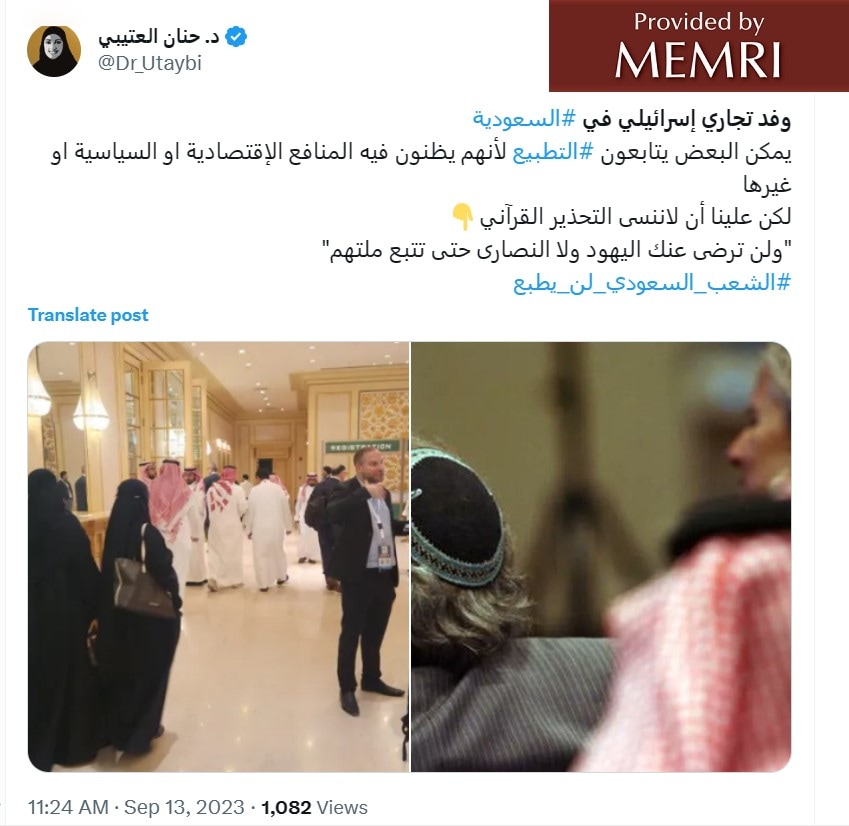
Turki Shalhoub, an X user with over one million followers and one of the most active users of the hashtag #Saudis_Will_Not_Normalize, argued in a post published on September 12, 2023: "Entering the Arabian Peninsula by non-believers is forbidden... So, how about those who want normalization with those who occupy the first of the two Qiblas, the Prophet's Night Journey, and shed the blood of Muslims and the innocent?"[2]
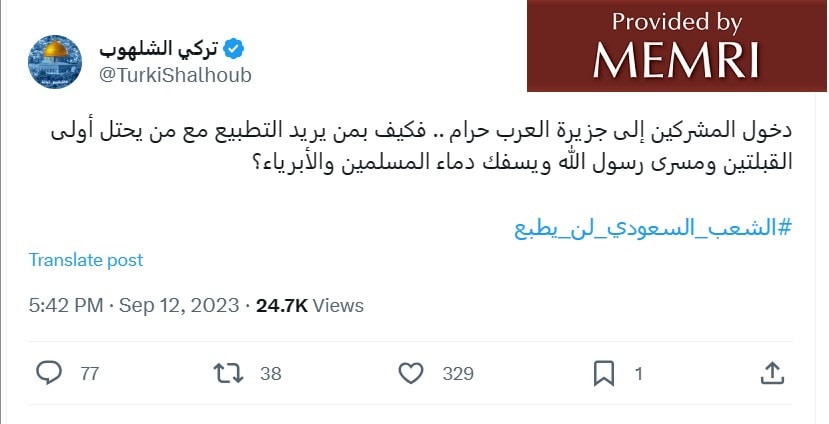
While there are no reliable indications that Saudi Arabia will normalize relations with Israel in the near future, Saudi dissidents and critics of the Saudi government believe that the kingdom's government, led by Crown Prince Muhammad Bin Salman (MBS), has been diligently working towards that goal, referring to his internal policies and measures as steps in the direction of normalization.
The U.K.-based Saudi dissident Alya Al-Hwaiti, who has over 90 thousand followers on X, claimed in a post published on September 13, 2023, that normalization between Saudi Arabia and Israel has been expected since 2018. She pointed to events such as Saudi Arabia's purchase of Israeli spyware Pegasus in 2017 and the imposition of a blockade on Qatar in June 2017 as factors contributing to this expectation. According to her, even the imprisonment of prominent clerics and radical preachers was designed to silence them and prevent them from opposing normalization with Israel. After accusing the House of Al-Saud of concealing having Jewish roots (an allegation trumpeted as an insult by opponents of the Saudis, including the regime in Iran)[3], Al-Hwaiti expressed certainty that the House of Saud will be overthrown as soon as they declare normalization. She called on the people of Saudi Arabia to "receive the glad tidings, prepare, and sharpen their swords."[4]

Al-Hwaiti's threat was reiterated by a Palestinian X user who refers to himself as "Alam Malaki" and expresses pride in having participated in the first Intifada. On September 13, 2023, Malaki wrote under the hashtag #Saudis_Will_Not_Normalize: "I have repeatedly and insistently said that the Saudi throne will be the cost of normalization with the alleged entity. Yes, your great-grandfather, Aziz, was able to trade us in 1911 with Sykes and Picot to establish the Kingdom of Blood with Abdul Wahhab in exchange for Palestine. But you, MBS, will not be able to ascend to the Saudi throne at the expense of the Palestinians in 2023."[5]
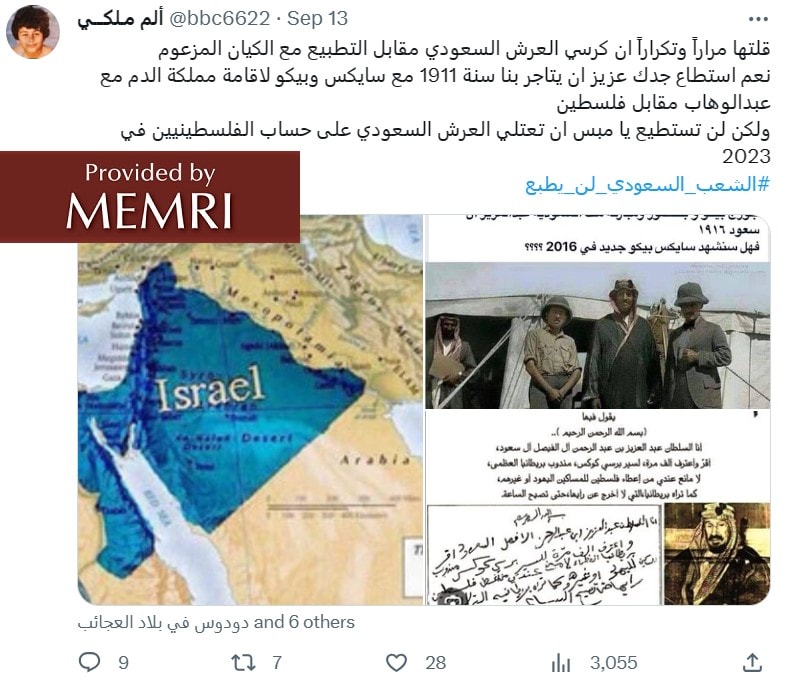
Another argument presented by critics of normalization is that Israel and the Zionists would benefit the most from normalizing relations with a country of significant importance in the Muslim world. On September 13, 2023, Saudi X user Oum Al-Hanouf wrote: "The normalization that our government is seeking will benefit Israel alone. The state that has been isolated for eight decades will revive through normalization with the most significant Islamic country. In short, the government will provide a very significant service to the Zionists."[6]

Other critics of normalization mocked Saudi scholars who emphasize that Islam allows Muslim rulers to decide whether to reconcile with non-Muslim governments or not, and that the Prophet Muhammad himself reconciled with non-believers. On September 13, 2023, Saudi X user Nourah Al-Harbi, who has over 53 thousand followers, shared a video featuring a Saudi cleric saying that Islam grants Muslim rulers the right to decide on matters of international relations to secure the best interest of the public. Mocking the cleric, she described him as "the sheikh of normalization" and asked, "Does the Sharia of Allah command us to establish relations with the aggressor occupier?"[7]

On the other hand, some supporters of normalization praise Crown Prince MBS, saying that since coming to power, he has insisted on the existence of a Palestinian state with Jerusalem as its capital, and his country is intent on acquiring a nuclear weapon, thereby ending 70 years of exploitation of the Palestinian issue. On September 13, 2023, Saudi political analyst Al-Aned Al-Harte wrote under the hashtag #Saudis_Will_Not_Normalize: "The Saudi people should take pride in the fact that the Crown Prince, during his eight years in power, has been able to assert on the world stage the existence of a Palestinian state with its capital in Jerusalem. His country now possesses nuclear weapons, thereby putting an end to seventy years of profiteering from the Palestinian cause. That's why there is a fierce campaign against him."[8]
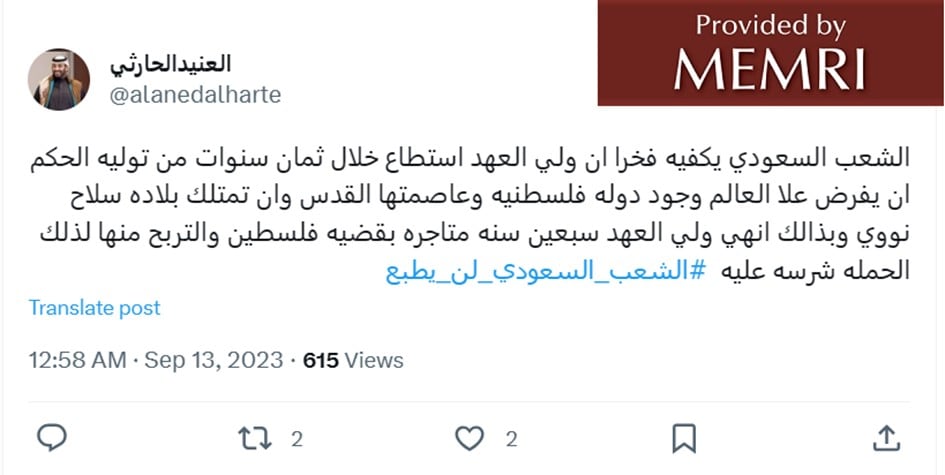
Assessing the potential of a Saudi-Israeli deal, Egyptian author Mamoun Fandy emphasized in a post published on X on September 14, 2023, that for any deal between the two countries to take place, Israel must make concessions. He listed three reasons for this: Saudi Arabia is a larger and more geopolitically important state than Israel; there is nothing that Israel can add to Saudi Arabia, and the two-state solution is a strategic goal for the King and the Crown Prince that cannot be abandoned. Additionally, he said, "No matter how clever Netanyahu may be, the new generation in the kingdom is not easily swayed by empty words. They understand that what Israel used to offer was access to Washington, but today it is Washington that is knocking on Saudi Arabia's door."[9]
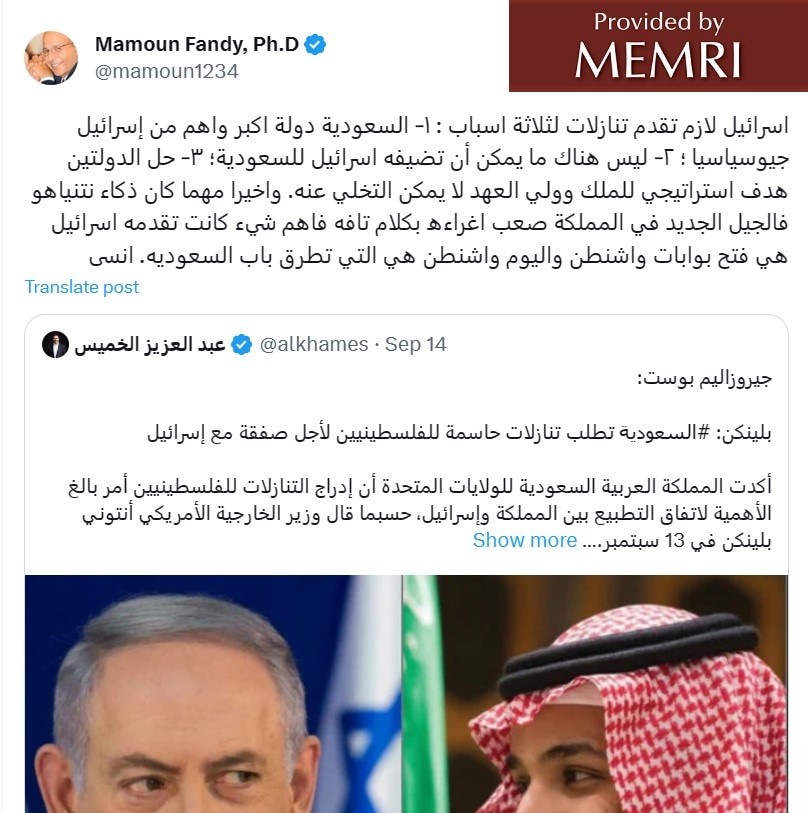
In an article titled "On the Normalization Question," published in Saudi magazine Majalla.com on September 7, 2023, Saudi writer and researcher Dr. Hesham Al-Ghannam stated that the "Grand Deal" between Saudi Arabia and Israel is said, according to leaks from mainstream media outlets, to include "NATO-like security assurances for Saudi Arabia, granting the Saudis access to sophisticated U.S. defense systems, and facilitating the establishment of a peaceful nuclear plant capable of uranium enrichment within the kingdom. In exchange, the leaks suggest that the U.S. is requesting Saudi Arabia to normalize its relations with Israel, abstain from advancing its relations with China and Russia, and end its involvement in Yemen's conflict."
Al-Ghannam then argued that by brokering this deal, the U.S. seeks to "curtail China's and, to a lesser extent, Russia's expanding influence within the Gulf region." In his assessment, "the major advantage for the Kingdom resides in the potential NATO-like defense agreement with the U.S. However, this gain might come at the expense of straining its economic relations with other major powers, potentially compromising its long-term security."
Concluding his article, Al-Ghannam stated that "the path to normalization between Saudi Arabia and Israel is riddled with complexities. Saudi Arabia will meticulously weigh the potential gains against its own interests while considering how to accommodate the American request for normalizing relations with Israel. With regional dynamics and international principles at play, it will follow a nuanced and cautious approach to this issue."[10]
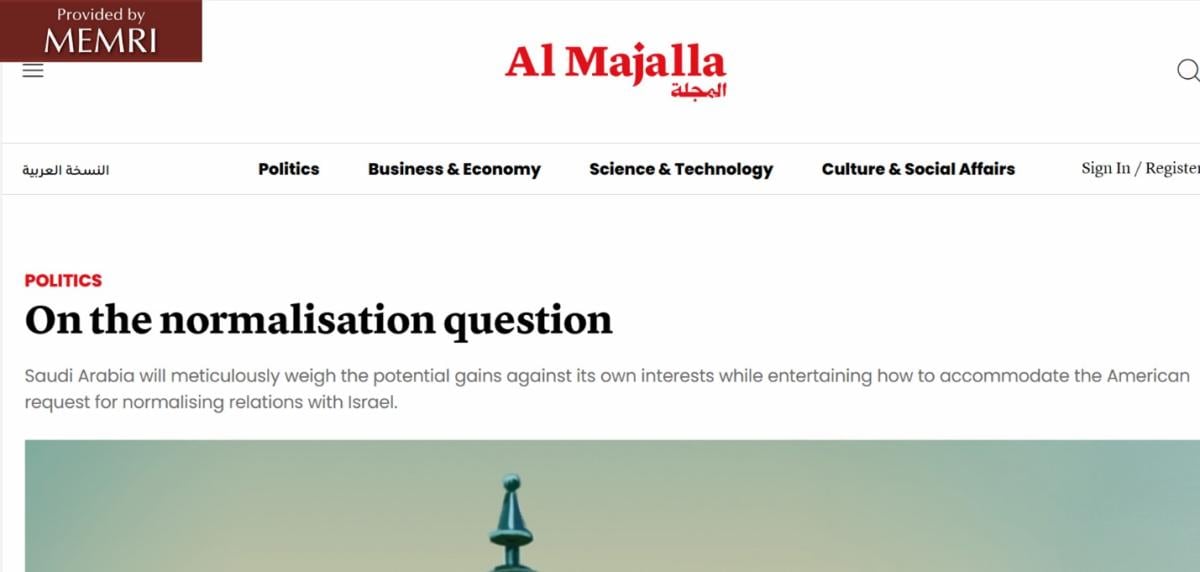
On September 14, 2023, Majalla.com published another article on the same topic, titled "The Costs and Benefits of Saudi-Israeli Normalization," written by Bilal Saab, the senior fellow and director of the Defense and Security Program at the Middle East Institute. In it, Saab highlighted the reasons why Saudi Arabia insists that the establishment of a Palestinian state, "or at least an effective process to create one," should be part of a deal with Israel.
He wrote: "The Crown Prince recognizes that if Saudi Arabia normalizes its relations with Israel, its recent diplomatic accord with Iran, which has maintained calm between the two arch-rivals, could be in jeopardy. Indeed, the moment the Saudi leadership officially embraces Israel, Iran will almost certainly create problems for Saudi Arabia. Therefore, when Saudi officials insist that normalization with Israel will not happen unless there is a Palestinian state or at least an effective process to create one, they are not being insincere or paying lip service to the issue."
Furthermore, Saab stressed that "Saudi Arabia cannot afford a normalization deal with Israel similar to the UAE and Bahrain, which merely suspends or freezes Israeli annexation of Jewish settlements and the Jordan Valley in the West Bank. It requires something more meaningful. If being friends with Washington is bad from Iran's perspective, accepting Israel is a whole lot worse. Not only does Iran not recognize Israel and often expresses its desire to wipe the Jewish state off the map, but the two nations have been engaged in a shadow war against each other over the past seven years."[11]
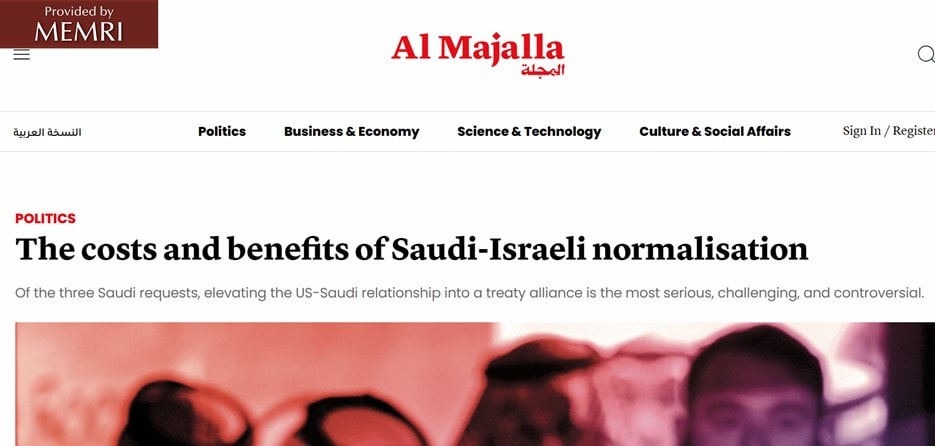
[1] Twitter.com/Dr_Utaybi/status/1701980122725962236, September 13, 2023.
[2] Twitter.com/TurkiShalhoub/status/1701712790577434934, September 12, 2023.
[3] https://www.memri.org/tv/irgc-navy-general-tangrisi-saudis-are-actually-jews
[4] Twitter.com/Alya_Alhwaiti/status/1701876195896242299, September 13, 2023.
[5] Twitter.com/bbc6622/status/1701937914345590822, September 13, 2023.
[6] Twitter.com/paintapduallh/status/1701961050122297586, September 13, 2023.
[7] Twitter.com/n_alharbi112/status/1701897531242823862, September 13, 2023.
[8] Twitter.com/alanedalharte/status/1701822578623430710, September 13, 2023.
[9] Twitter.com/mamoun1234/status/1702391216866828346, September 14, 2023.
[10] En.majalla.com/node/299141/politics/normalisation-question, September 7, 2023.
[11] En.majalla.com/node/299621/politics/costs-and-benefits-saudi-israeli-normalisation, September 14, 2023.




